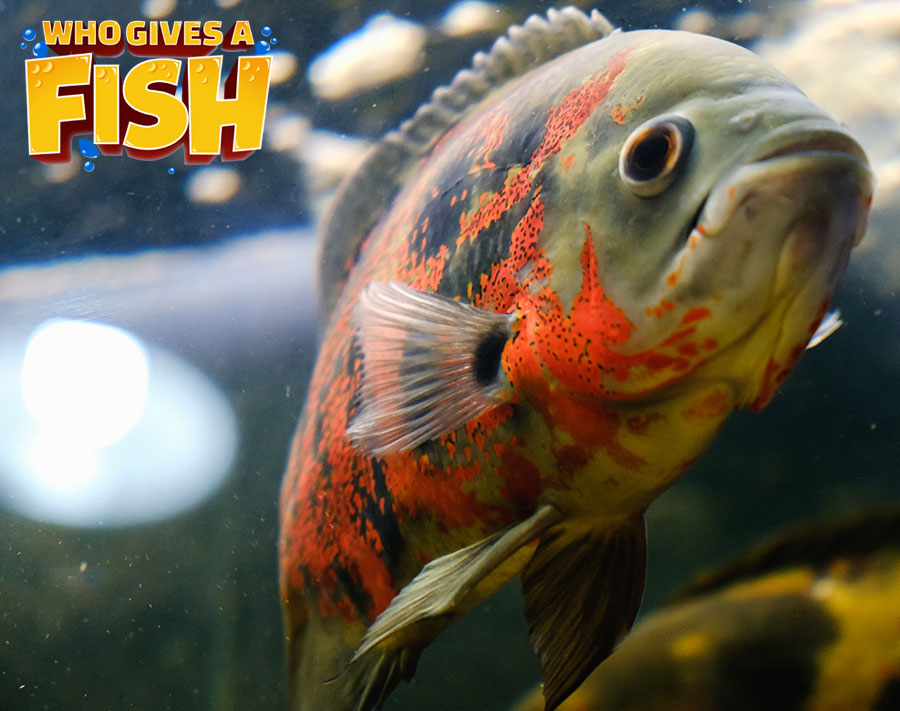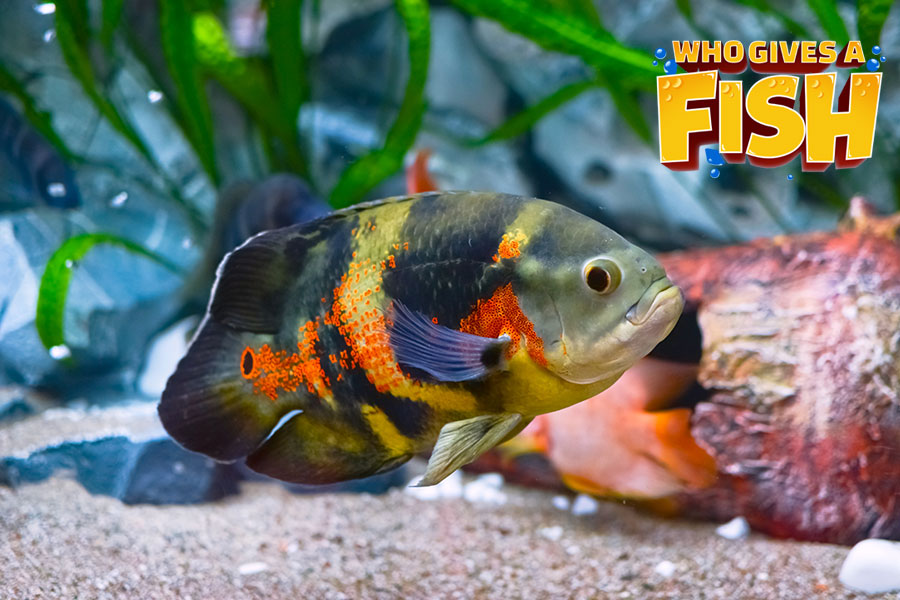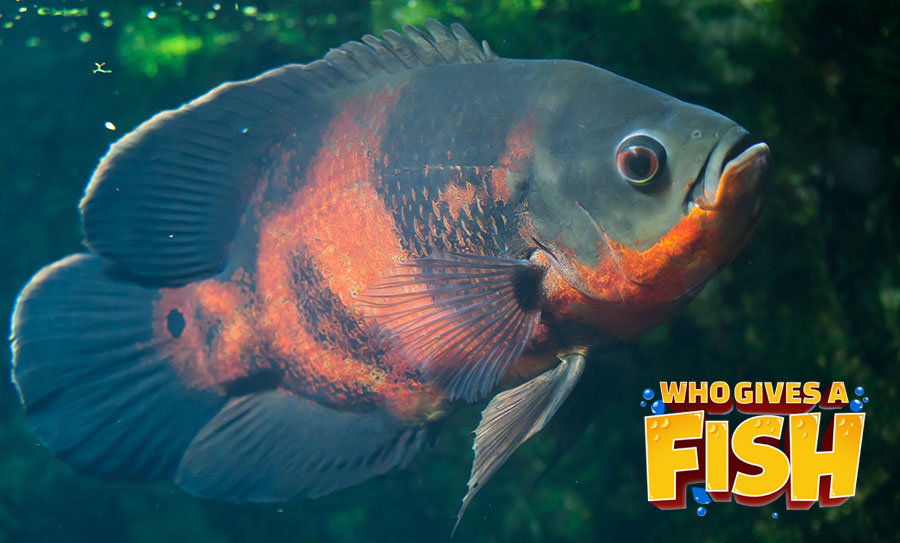Oscar Cichlid
The Oscar Cichlid, Astronotus ocellatus, is a large and very popular Cichlid in the freshwater fish keeping hobby. A South American Cichlid, the Oscar can grow over a foot long! Oscars are very playful fish and are very curious. Many owners of Oscars comment on how each fish develops a unique and curious personality. Keepers who have had their Oscars for a few years have been able to teach them tricks and often perform for food. They truly are a unique pet with personality.
- Experience Level: Beginner
- Hardiness: Hardy
- Minimum Tank Size: 100 gal (380 L)
- Maximum Size: 15 inches (38 cm)
- Temperament: Aggressive – Predatory
- Temperature: 72 – 77° F (22.2 – 25° C)
- pH Range: 6.5 – 7.2
- Water Hardness: 5 – 20 dGH
- Diet: Carnivore
Table of Contents
Introduction
Aquarium Setup
Difficulty
Feeding
Breeding and Social
Oscar Cichlids are very easy to keep, however, the only concerns that any owner must be aware of is their quick growth in size and aggression. A large aquarium is definitely needed for any more than one of these Cichlids, and community tanks require great planning towards aggression mitigation.
Being such a curious fish, this Cichlid will be very playful and often boisterous, moving around rocks and other aquascape such as plants and decorations. All equipment and items inside the tank need to be carefully thought out regarding placement, and must be securely fastened to avoid any falls or damage.
Aquarium Setup
Smaller Oscar Cichlids will do just fine in smaller tanks, however, you must take in to account the size that these fish will grow to, and upgrade your tank to accommodate them accordingly. It is recommended that you have at least 50 gallons for each mature Oscar. They also prefer a low to moderate flow throughout the tank and it is important that you oxygenate the water through the use of an airstone or similar, in order to keep the otherwise slow moving water, highly oxygenated.
As mentioned earlier, it is essential that all of your equipment such as heaters, in and out flow and other items, including your aquascape, are secured. The playful and inquisitive Oscar will cause you no end of trouble if you do not secure items in your tank, and have been known to cause damage when big rocks tumble because of their digging and moving of rocks.
Plants will not do very well, unless you can provide ample swimming space and feed them several times per day in order to curb hunger and aggression. Most plants, however, will simply be moved and eaten overnight. Don’t be surprised if you wake up to a new tank layout each morning if you have not properly secured the items inside the tank.
These Cichlids produce a heavy bioload and your water filtration should be no less than excellent.
Oscar Cichlid Aquarium Guide
- Minimum Tank Size: 100 gal (380 L)
- pH Range: 6.5 -7.2
- Water Hardness: 5 – 20 dGH
- Temperature: 72 – 77° F (22.2 – 25° C)
- Lighting: Normal lighting
- Substrate: Sand/Fine Gravel
- Brackish: No
- Water Flow: Low/Weak
- Tank Region: All regions
Difficulty
Although these Cichlids are fairly hardy and easy to keep, it is important to remember that they can become highly aggressive and very boisterous. Do not be fooled by local pet stores housing these in smaller tanks and with other fish. In your home aquarium, there is a very high chance that other smaller fish will be hunted and eaten, or simply killed and left to rot.
As with all breeds, it is essential to understand this Cichlids behavior and growth potential so that you can correctly plan and manage tank aggression and mitigate fish loss.
Feeding
A natural carnivore, the Oscar Cichlid prefers insects such as crickets and other crustaceans and small shrimp. You can feed them Oscar specific pellet foods, and flake foods when they are much younger. You can also feed them small guppies, goldfish, worms and mollies. It is not advised to feed them animal proteins that are high in fat such as beef or pork products as this can cause them bloat and is not a natural food source. Chopped shrimp/prawns and other non oily fish is recommended.
Oscar Cichlid Feeding Guide
- Diet: Carnivore
- Frequency: Several small feedings per day
- Pellet Foods: Oscar specific pellet food
- Flake Foods: When younger, Oscar and Cichlid specific flake food
- Live Foods: Crickets, worms, mollies, goldfish and guppies
- Meat Foods: Non oily fish. No animal meats such as beef and pork products.
- Vegetable Foods: Occasionally offer some slightly cooked dark leafy greens.
Breeding
Determining their sec can be difficult and if you are aiming to breed these Cichlids, it is advised to buy 4 – 6 fish and allow a pair to form naturally. Mature specimens are easier to identify as the female has an egg tube next to the anus whereas the male obviously will not.
Oscars will breed quite easily provided you give them flat surfaces to use such as rocks or terracotta/ceramic pots. They are sexually mature around 4 inches (10 cm). It is important that you provide a big enough tank for a pair (at least 100 gal) and that the water quality is excellent.
Raising the water temperature to around 89° F (30° C) will promote breeding, however, water hardness is not much of a requirement as they have been known to breed from soft through to hard water conditions. Again, the only requirement for the water is that it is exceptionally clean and this can be achieved through strong filtration and 2 to 3, 20% water changes per week.
They are egg layers, and will produce on average 1500 eggs. Once the eggs hatch and become free swimming, the parents will often herd them into a dug out pit in the substrate to watch over them. They are vulnerable to high suction on water intakes so ensure your filter intake is covered with a fine sponge/cover and that other fish are well fed. You can remove the fry after 10-14 days and raise them in a separate fry tank on finely crushed Cichlid flake and cyclops.
Social
These are not to be considered as a community fish. They are highly aggressive and predatory. Other fish such as Jack Dempsey Cichlids and cleaner fish such as the Plecostomus will be OK, provided they are big enough and that the tank has ample room to spread aggression. It is not wise to add tankmates to an already established Oscar tank as they will likely be bullied and killed.




